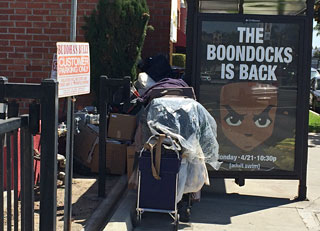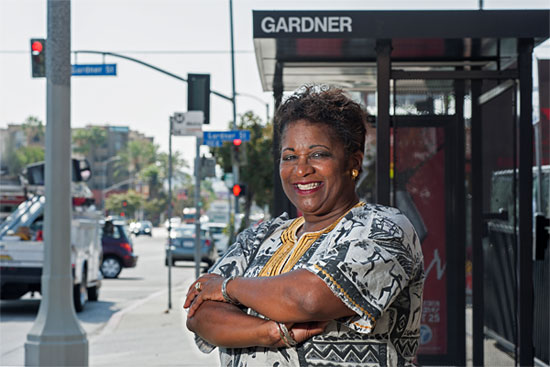A force of our best nature
August 21, 2014
Cynthia Langley is no quitter. Lives depend on that.
A social worker for more than three decades, Langley fights chronic homelessness one weary soul at a time, spending day and night trying to persuade the most entrenched residents of the street to give housing a chance. She’s never welcomed with open arms. But in the end, she receives enough hugs of gratitude to keep her spirits strong.
“Someone has got to reach out to these individuals. They’re somebody’s son, somebody’s brother, somebody’s cousin, somebody’s loved one,” says the 58-year-old Langley, herself a grandmother of four. “And I’m stubborn enough not to take no for an answer.”
Earlier this year, I called upon Langley’s employer, the miracle-working Step Up on Second, for help on a case that would take every ounce of her stubbornness and devotion.
For more than a decade, a homeless man had taken over a bus shelter on Beverly Boulevard at Gardner Street near the Fairfax area. Over the years, he’d amassed a rising mountain of boxes and bags. The situation was no longer acceptable—for him or the community.
I knew that if anyone could get him off the street it was Step Up on Second, a Santa Monica-based nonprofit that provides permanent supportive housing to the most vulnerable of our homeless population. In fact, I’d recently allocated county funds to the organization to expand its outreach into the Beverly corridor, an area of increasing homelessness. Langley was brought aboard with that money and would soon come face-to-face with one her toughest challenges—a 64-year-old man who’d come to be called the “Professor.”
What happened during the next four months is both inspiring and instructive—a real-life look at what it actually takes to bring about the first steps in a long journey of recovery. It’s a remarkable story of skill, perseverance and trust, one with a happy beginning but no promise of a satisfying ending. That simply is the reality we face in trying to coax the homeless into homes, especially those who, like the Professor, are battling mental illnesses.
Langley says the first time she met the Professor at his bus stop, he was sitting, as usual, with his back to the street, keeping an eye on his belongings piled high behind the shelter. It was a chilly morning and he was wearing a big brown coat. “He turned around slowly with an angry, suspicious look,” she recalls. After Langley explained why she was there, the Professor said flatly: “I’m not interested.”
“Would you mind if I came back?” Langley asked. He turned his back on her. But she returned anyway, day after day, always deferential. “I know you’re busy,” Langley would say, “so what times work for you? What do you prefer?”

The Professor's belongings at Beverly Boulevard and Gardner Street, before he moved into his own apartment.
Soon, the facts of his life started slowly unspooling: He was born in Germany. He was physically abused by his father. He immigrated to the U.S. as a teen with his family. He went to UCLA and earned a bachelor’s degree in military science and a master’s in medieval history. He served in the Army. He never married. He even worked as
an adjunct professor at UCLA (hence the respectful nickname bestowed on him by Step Up on Second.)
Eventually, he began sharing with Langley the rituals of his daily life. He told her he’d spend hours at the neighborhood Starbucks. He’d clean up in the bathrooms at Pan Pacific Park, across the street from the bus shelter. Nice people would regularly bring him food and clothing. He’d been living this way, he said, for 14 years.
It also became clear to Langley and the team at Step Up on Second, including program director Dr. Michael Marx, that the Professor was distrustful and erratic. One day he’d be cooperative, the next combative, launching into diatribes and rants. He worried that the Starbucks was bugged.
Langley says she tried to stay mindful of the professor’s delicate mental state. She’d make sure to ask him, for example, whether it was all right for her to take a few notes as they spoke. That way, he wouldn’t think she was scribbling secret things about him to give to the government. Sometimes, he’d get racially provocative. “You’re African American,” he’d say to Langley, “what do you know?” But Langley would say calmly, without a hint of the irritation she felt: “Everyone has a right to their opinion.”
Always, she’d steer the conversation back to the primary objective.
“You’re just another one of those people who think they’re going to get me housed,” he’d say. “You’re right,” she’d answer. “I’m going to keep trying. I really do care about you and I’d like to see you living in a comfortable place. One day, I can imagine you housed. Can you imagine that?”
“No,” he’d respond. “I’m always going to live on the street.”
Still, he was continuing to open up. He eventually gave Langley a link to his past, a friend from his UCLA days with whom he’d once lived just a few miles away—the last home the Professor would know.
When Langley and Marx visited the friend, he said the Professor had been seriously hoarding and he had no choice but to ask him to leave, although they remained in contact. The friend, now in his 70s, also gave Langley and Marx an old datebook the Professor left behind, containing, among other things, his social security card, his honorable discharge from the Army in the 1980s and photos from years back.
Finally, in May, a breakthrough came when Langley and Marx asked the Professor if he’d like to see the Hollywood apartment that, just in case, had been reserved for him at a place called Michael’s Village. To the amazement and elation of the Step Up on Second team, he agreed to get in Langley’s car and go. When they walked inside, Marx took the lead.
“You’re a professor, can’t you imagine yourself sitting here writing?”
“Yes, I could,” the Professor responded. “This is for me?”
“This is your unit.”
“It’s too good to be true,” the Professor said.
“It is good, and it is true,” Marx assured him.
As Langley listened to the conversation, one thought kept going through her mind: “We got him.”
In the weeks ahead, there’d be more challenges to moving the Professor into his apartment. At one point, he changed his mind and vanished for a few days. But his old friend helped bring him back into the fold. He also suddenly became distrustful of Langley, who knew better than to personalize a snub rooted in mental illness. In fact, when it came time to sign the housing contract and other paperwork, Langley went so far as to duck under her desk so she wouldn’t agitate the Professor and send him back out the door.
The Professor finally moved into his unit at Michael’s Village earlier this month. Now, of course, comes the really hard part. Marathoners have a saying that the course is divided into two halves—the first 20 miles and the last 6, the most grueling stretch. That seems an apt description for the difficulties the Professor will confront as he tries to adjust to a roof over his head and neighbors all around him. He is no longer slipping through the cracks.
Fortunately, although he’s got a good distance to go, he’s finally on course—with a committed and compassionate team behind him, coaching him along the tough road ahead.
As for Langley, she’s already focusing her energies on a homeless man about a half-dozen blocks away at First and Detroit streets.
“I think we got him,” she says.
Posted 8/21/14













 405 bridge work causes a stink
405 bridge work causes a stink





